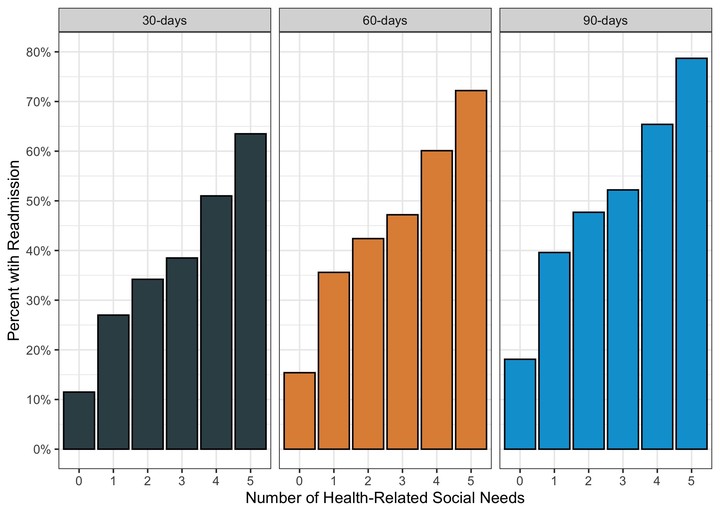Health-Related Social Needs and Increased Readmission Rates: Findings from the Nationwide Readmissions Database

Abstract
Background: While health-related social needs (HRSN) are known to compromise health, work to date has not clearly demonstrated the relationship between clinically acknowledged social needs, via ICD-10 Z-codes, and readmission.
Objective: Assess the rate of 30-, 60-, and 90-day readmission by the level of ICD-10-identified social need. In addition, we examined the associations between demographics, social need, hospital characteristics, and comorbidities on 30-day readmission.
Design: Retrospective study using the 2017 Nationwide Readmission Database
Participants: We identified 5 domains of HRSN from ICD-10 diagnosis codes including employment, family, housing, psychosocial, and socioeconomic status (SES) and identified how many and which an individual was coded with during the year.
Main Measures: The proportion of patients with 30-, 60-, and 90-day readmission stratified by the number of HRSN domains with a multivariable logistic regression to examine the relationship between the number/type of and readmission adjusting for sex, age, payer, hospital characteristics, functional limitations, and comorbidities.
Key Results: From 13,217,506 patients, only 2.4% had at least one HRSN diagnosis. Among patients without HRSN, 11.5% had a 30-day readmission, compared to 27.0% of those with 1 domain, increasing to 63.5% for patients with codes in 5 domains. Similar trends were observed for 60- and 90-day readmission; 78.7% of patients with documented HRSN in all 5 domains were hospitalized again within 90 days. The adjusted odds ratio for readmission for individuals with all 5 domains was 12.55 (95% CI: 9.04, 17.43). Housing and employment emerged as two of the most commonly documented HRSN, as well as having the largest adjusted odds ratio.
Conclusions: There is a dose-response relationship between the number of HRSN diagnoses and hospital readmission. This work calls attention to the need to develop interventions to reduce readmissions for those at social risk and demonstrates the significance of ICD-10 Z-codes in health outcomes studies.